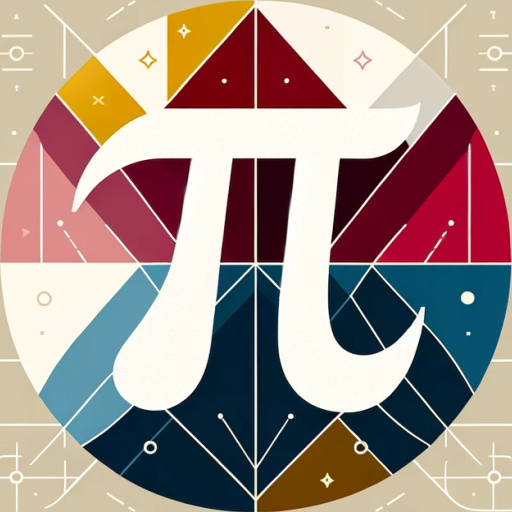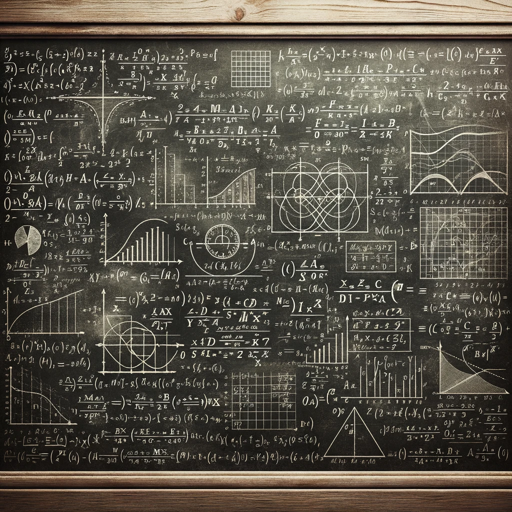math-Math Problem Solver and Tutor
AI-powered Math Assistance
What is the the root of x+3=15
Evaluate the definite integral: ∫[0,1] (3x^2 - 2x + 1) dx
Find the sine of a 30-degree angle
actorize the expression x^ 2 − 4 x 2 −4.
Related Tools
Load More
math
The worlds most powerful math tool.

math
Solve Advance Math questions with Concepts & Steps using Image or Text. Previously Math Expert.

math
The worlds most powerful math tool. Solve math problems in different languages with step-by-step solution.

Math and Statistics Pro
Expert in solving high-level math and statistics problems.

Advanced Math and Matrix Expert
Deep expertise in matrix diagonalization and applications.

Advanced Math and Finance Solver
Expert in solving math and financial engineering problems.
20.0 / 5 (200 votes)
Introduction to Mathematics
Mathematics is a fundamental discipline that explores numbers, quantities, shapes, and patterns. Its primary purpose is to provide a systematic framework for understanding and manipulating abstract concepts to solve real-world problems. Mathematics is divided into various branches, such as arithmetic, algebra, geometry, calculus, and statistics, each focusing on different types of problems and methods. For example, in algebra, we solve equations and understand relationships between variables, while in geometry, we study properties and relations of points, lines, surfaces, and solids.

Main Functions of Mathematics
Arithmetic
Example
Calculating the total cost of groceries by adding individual prices.
Scenario
A person goes to a store and buys five items priced at $2, $3, $1, $4, and $5. Using arithmetic, they can sum these prices to determine the total cost.
Algebra
Example
Solving for x in the equation 2x + 3 = 11.
Scenario
In a business setting, an algebraic equation can be used to determine the required number of units to sell (x) to achieve a desired profit. If each unit contributes $2 to the profit, and there is a fixed cost of $3, solving the equation helps in financial planning.
Geometry
Example
Determining the area of a rectangular garden that is 10 meters long and 5 meters wide.
Scenario
A landscape designer uses geometry to calculate the area of different sections of a garden to estimate the amount of materials needed for landscaping, such as soil, plants, and fencing.
Calculus
Example
Finding the maximum profit by analyzing the cost and revenue functions.
Scenario
A company uses calculus to optimize its production levels. By finding the derivative of the profit function and setting it to zero, the company can determine the production level that maximizes profit.
Statistics
Example
Analyzing survey data to understand consumer preferences.
Scenario
A market researcher uses statistical methods to interpret data from a survey. They can calculate averages, medians, and standard deviations to summarize the data and make informed decisions about product launches or improvements.
Ideal Users of Mathematical Services
Students
Students at all levels, from primary school to university, benefit from using mathematical tools and services to understand concepts, complete assignments, and prepare for exams. Mathematics provides a foundational skill set that is essential for academic success in various subjects.
Professionals
Professionals in fields such as engineering, finance, economics, and data science use mathematics to model complex systems, analyze data, and make informed decisions. For instance, engineers use calculus and geometry to design structures, while financial analysts use algebra and statistics to evaluate investment opportunities.
Researchers
Researchers in scientific fields rely on advanced mathematics to conduct experiments, analyze results, and develop new theories. Mathematics is crucial in fields like physics, chemistry, and biology for modeling phenomena and interpreting experimental data.
Everyday Users
Everyday users, including individuals managing personal finances or small business owners, use basic mathematical skills for budgeting, financial planning, and problem-solving in daily life. Arithmetic and basic algebra help in making informed decisions and managing resources efficiently.

How to Use Math Effectively
Step 1
Visit aichatonline.org for a free trial without login, also no need for ChatGPT Plus.
Step 2
Familiarize yourself with basic mathematical concepts and principles relevant to your needs.
Step 3
Practice regularly by solving problems and applying math in real-world scenarios.
Step 4
Use online resources, such as tutorials and interactive tools, to enhance your understanding.
Step 5
Seek help from online forums, math communities, or tutors if you encounter difficult topics.
Try other advanced and practical GPTs
Data Extractor and Visualization Tool
AI-powered data extraction and visualization tool.

海报设计/ Poster designer
AI-powered poster design made easy.

Academic Poster Assistant
Enhance Your Academic Posters with AI

GLSL GURU
AI-powered GLSL coding assistant.

TouchDesigner Assistant
AI-powered guidance for TouchDesigner projects.

IB Math AA HL Chad Mentor
AI-powered mentor for Math IA

Laravel 11+ View Maker
AI-Powered Laravel View Generator

Facebook Marketing Advisor
AI-Powered Insights for Facebook Marketing

Facebook Ad Copywriter
AI-powered Facebook Ad Creation

DanGPT Delingstekster
AI-powered Social Media Sharing Texts

Fejsbučik master
AI-Powered Social Media Content Generator

Binary Tree Expert
AI-Powered Insights for Binary Tree Mastery

- Problem Solving
- Exam Prep
- Homework Help
- Concept Review
- Skill Building
Common Questions About Using Math
What are the basic prerequisites for learning math?
The basic prerequisites include a fundamental understanding of arithmetic, algebra, and geometry. These form the foundation for more advanced topics.
How can math be applied in everyday life?
Math can be applied in budgeting, cooking, home improvement projects, and problem-solving in various professional fields such as engineering, finance, and technology.
What resources are available for learning math online?
There are numerous resources such as Khan Academy, Coursera, edX, and various math-specific websites offering tutorials, exercises, and interactive tools.
How does one overcome math anxiety?
Overcoming math anxiety involves consistent practice, starting with simpler problems, seeking help when needed, and using positive reinforcement to build confidence.
What are some tips for excelling in math?
Tips include understanding the underlying concepts, practicing regularly, using mnemonic devices to remember formulas, and applying math to real-world situations for better retention.